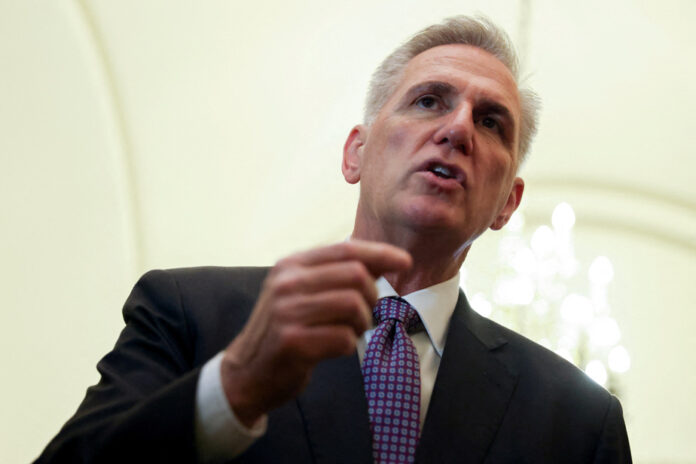(Washington) The elected members of the House of Representatives began to vote on Wednesday on the text aimed at raising the debt ceiling, which the leaders of the two parties hope to see adopted despite fierce reluctance on both sides.
The result of marathon negotiations and ripped off with forceps over the long Memorial Day weekend, the text must make it possible to avoid the worst: that the coffers of the country find themselves dry next Monday, then risking bringing the United States to the default of payment.
To avoid this scenario with potentially catastrophic repercussions for the economy, Democratic President Joe Biden and Republican House Leader Kevin McCarthy concluded an agreement this weekend, which, like any compromise, did not fully satisfy anyone.
After a first close vote in committee on Tuesday, the text will be discussed Wednesday evening in plenary session in the Lower House, controlled by the Republicans.
Their leader Kevin McCarthy admitted that he would not have the full voice in his camp, while displaying his optimism. “Today we will enact the largest budget cuts in American history,” he emphatically told reporters.
And for good reason, the Democratic leaders, although they were forced to alter the federal budget, have undertaken to bring the votes that would be missing from this text.
“House Democrats will ensure the country does not default. One point, that’s all,” said their leader Hakeem Jeffries.
“We will not let the extremist Republicans weigh down our economy and make Americans suffer, even if it remains to be seen how the mechanics will be put in place” in the hemicycle, he added, hoping that Kevin McCarthy rallies at least two-thirds of his group, or 150 votes.
In the same vein, the leader of the Democratic majority in the Senate promised to submit the text “as quickly as possible” to the elected officials of the upper house. “It is imperative that we avoid default,” said Chuck Schumer.
Joe Biden is heading to Colorado on Wednesday night. Before he left, he said he hoped the legislation would pass the House before he arrived in the western US state.
“By the time I land, Congress will have acted, the House will have acted, and we will have taken another step,” said the US president, who had already “strongly” called on elected officials to adopt the latest text. day before.
In both camps, however, many voices have made it known that they will not vote for the text.
Among Republicans, the main criticism came from the Trumpist wing, which called for more spending cuts. Texas MP Chip Roy slammed a “bad deal” that “no Republican should vote for.”
Some members of their group are even considering a motion of no confidence to force Kevin McCarthy off the roost. The proposal can be tabled by a single elected representative.
More moderate voices, such as that of South Carolina elected official Nancy Mace, will also be missing. “This ‘agreement’ formalizes the record level of federal spending during the pandemic and establishes it as the baseline for future spending,” she said.
On the Democratic side, left-wing elected officials like Pramila Jayapal and Alexandria Ocasio-Cortez refuse to support a text “imposed” according to them by the Republicans.
The bill suspends the debt ceiling until 2025, i.e. after the presidential elections at the end of 2024.
In exchange, certain expenditures will be limited in order to keep them stable, excluding military expenditures, in 2024 and increasing by 1%, excluding inflation, in 2025.
It also provides for a $10 billion cut in funds allocated to tax services to modernize and strengthen controls.
McCarthy’s office also said the deal provides for the recovery of “billions of dollars in unspent COVID-19 funds” during the pandemic, without further details.
A major point of contention, the compromise includes changes to the conditions imposed to benefit from certain social assistance: it increases from 49 to 54 the age until which adults without children must work to receive food assistance, but it eliminates this obligation to work for veterans and the homeless.















